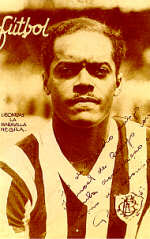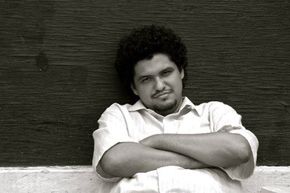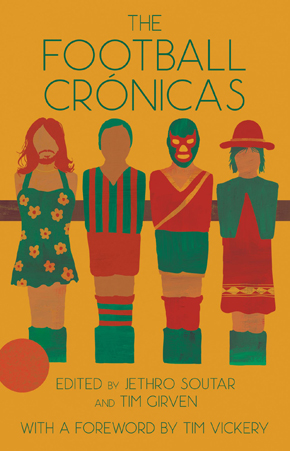The invention of futebol
by Vinicius JatobáThe crowd piled in around the São Cristóvão pitch and there were police and firemen, bacchanal experts and moonshine connoisseurs, employers and employees, handymen of every sort, pretty girls with cavityless smiles and a multitude of delicacies from Canal do Mangue and Ilhas dos Melões, said Tio Balela. The crowd was already in a frenzy, for over in France, Brazil had beaten Poland in a six-five thriller, Leônidas scoring a hat-trick, and so it was madness in the stands, more like a Deixa Falar carnival ball than a football match. The gringos laughed and savoured every minute of the non-stop party, and silence only descended when Padre Macedo from the Largo da Prainha church came onto the pitch to say some nice words about love and peace and brotherhood, and he closed his Bible and everyone clapped and then he sat down on the port team’s substitutes’ bench, for the hallowed priest was our intrepid coach.
Lining up to represent the port was the best team in all the world, players who have gone down in folklore and are still talked about today. There was Seu Bahia and Girino and Fradinho and Sebastião Lourenço and Jaime Mocoso, who sang the national anthem in tears, and Madame Leila Buriti in shorts and shirt but with a rosy-pink mouth, and there was Rasteiro, his hair standing on end like a drowned rat, and Lero, Raposo and Mascate, Meire Lorde’s three sons from three different port beauties. There was Japonês Anastácio, who couldn’t shoot for toffee but was good in the air, Severo Augusto Matraca Leocácio, fugitive leader of the dockers’ union, who Comandante Brito pretended not to recognise, and whenever someone told him it was the much-feared Matraca he’d tell them to wash their mouths out with soapy water and buy themselves a pair of specs, and Roncador, all gallant in brilliantine and a red bandage on his arm, so bright that when people said to Comandante Brito it was a communist or anarchist or rabble-rousing symbol, Comandante Brito said, actually it’s a wine-coloured ribbon in honour of Nossa Senhora da Conceição and we’d do well to respect a citizen’s faith, please, friends. And there was Cinco Pernadas, said Tio Balela, a bundle of fury and huff and puff, and when people said to Comandante Brito, my dear Comandante, aren’t you going to arrest that dangerous outlaw, he said, it can’t be Cinco Pernadas, because Cinco Pernadas died after being stabbed fifteen times on the Canal do Mangue, everyone knows that, this here is Evandro da Silva Berto, a good man and a law-abiding citizen, and well dressed besides.

Leônidas da Silva, the ‘black diamond’, was top scorer at the 1938 World Cup
Lining up to represent the gringos were just a bunch of ugly people, said Tio Balela, at least they were until afterwards, when in the post-match celebrations we got to know them inside out. There was Franquarque, short and stocky, arms thicker than his legs, a man who marked forwards so closely that, seen from a distance, it looked like love and courtship, and when he’d gone home the fruits of his visit blossomed and they all had arms thicker than legs and they formed a travelling circus, so I’m told. Alberto Royal, who ran so fast that in one enthusiastic burst of speed he kicked up clouds of dust and came to a halt only when he reached the gates to the São Cristóvão main entrance, and afterwards he took such a shine to a girl in Estácio that I’m told he dreamt up a samba, in a language he didn’t even understand, wrote it down on a piece of paper and gave it to her, and it was such a fine samba it’s still sung today.
There was Samuel Açougue, said Tio Balela, a man who loved other people’s legs so much he seemed determined to take home the shin bones of any player who crossed his path, with or without the ball, and who nearly split Japonês Anastácio in two with an off-the-ball tackle. There was Fred Com-Pé, who performed a somersault in the middle of the pitch, thinking he was Leônidas, and played the rest of the game with a limp, wittering on in that budgie language of theirs, and then there was another called Estildarte, said Tio Balela, who scored a goal with his left foot and another with his left hand, and who, with his matinee looks, became the idol of the Canal do Mangue girls, who flashed their titties at him whenever he went near the touchline, and there was Colunga, who at one point in the game fell on top of Madame Leila Buriti and remained there for over six minutes, forming an obstacle in the middle of the pitch that half the crowd said was the ding-dong of the century and half said was ill-fated love, and either way Padre Macedo gave them his blessing afterwards, much to the delight of everyone in the grocery store.
But the devil himself was Bile Cutão, said Tio Balela. That young buck dressed up a haggard face with a scruffy little goatee and he ran on the tips of his toes with jumps so fleet he looked like a cavy, and he ran and ran and never came to a stop, not even when the ball left the field of play. Bile Cutão was a man of faith, said Tio Balela, for when a cross came over he leapt in the air when the ball was still high in the sky, and the ball seemed to move towards his head out of respect for the audacity of the man, and he was such a good footballer that for every two goals the gringos scored, three of them were his. At one point in the game he’d scored four goals in a row and Comandante Brito had to be talked out of arresting him, and even when Lero, Raposo and Mascate hugged hold of his swivelling hips as he burst forward with the ball, the skinny young buck just dragged the poor lads along with him, and almost knocked Rasteiro’s head off with his shot.
It’s an established, engraved and undisputed fact that the dish invented by the English had been reinvented by Brazil, we’d made it our own, ours to feast on.”
He was a legend was Bile Cutão, said Tio Balela, and for every goal Rasteiro or Cinco Pernadas scored, Bile Cutão responded in kind, and the gringo was so full of cunning and jiggle that an incredulous drunk shouted, that whitey’s so good he must be a black albino. Nevertheless, the port team proved a match for the gringos. Ecstatic supporters invaded the pitch at the final whistle, raising quaysiders and gringos alike aloft, for they were all heroes that day, and we went from grocer’s store to liquor store to tavern to bar, and we ended up sitting our backsides down on the pavement outside Young Abrão’s as he handed out cachaça and wine and cognac, and he even presented every player with a hat that smelt of fresh leather. The revelry was such that the score got forgotten, said Tio Balela, and even today it’s hotly disputed in bars and restaurants from Praça XV to Praça Mauá.
What is known, for it’s an established, engraved and undisputed fact, said Tio Balela, is that the dish invented by the English had been reinvented by Brazil, we’d made it our own, ours to feast on. Young Abrão and Old Abrão and Seu Nino would have said the same, and the whole world knew it too, after listening to radio commentators describe, in every language under the sun, the tricks and flicks performed by Leônidas, Domingos, Batatais, Nariz, Britto and the rest of our footballing gods on the brioches of France. Not even the ref who darkened Domingos da Guia’s good name by inventing a penalty, blatantly gifting the Italians victory in the semi-final, could undo what had been done that heavenly year of 1938, because we’d all become princes, said Tio Balela, and as the old samba went, let the gringos keep their crown, they who have blondes but have no brunettes, for we were all princes and we had a king who’d no need of a crown, and that king was Leônidas da Silva.
From ‘The Big Family’, translated by Jethro Soutar, in The Football Crónicas.
 Vinicius Jatobá was selected by Granta as one of the Best of Young Brazilian Novelists in 2012 and has since had stories published in English, French, Spanish and German. His first novel, Elegy, will be published in 2015. He is also a prize-winning dramatist and the recipient of the prestigious Icatu Prize for Arts.
Vinicius Jatobá was selected by Granta as one of the Best of Young Brazilian Novelists in 2012 and has since had stories published in English, French, Spanish and German. His first novel, Elegy, will be published in 2015. He is also a prize-winning dramatist and the recipient of the prestigious Icatu Prize for Arts.
Jethro Soutar is a writer and a translator from Spanish and Portuguese. He has translated Argentinian and Brazilian crime fiction for Bitter Lemon Press, and his translation of By Night the Mountain Burns by Juan Tomás Ávila Laurel is forthcoming from And Other Stories.
The Football Crónicas is a not-for-profit book of football-themed writing edited by Jethro Soutar and Tim Girven, and published by Ragpicker Press. At the book’s core are 11 crónicas, a hybrid writing form that combines journalism and storytelling. Subjects include a prison team in Argentina, a transvestite team in Colombia, a kidnapped team in Bolivia, Quechuan women playing in bowler hats in the Peruvian Andes, a Latino immigrant league in New York, and Chilean hooligans on an away trip to Buenos Aires; there is also an extract from a creative non-fiction book, and short fictions from Paraguay, Peru and Brazil. Read more.


